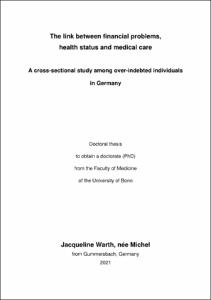The link between financial problems, health status and medical careA cross-sectional study among over-indebted individuals in Germany

The link between financial problems, health status and medical care
A cross-sectional study among over-indebted individuals in Germany

| dc.contributor.advisor | Weckbecker, Klaus | |
| dc.contributor.author | Warth, Jacqueline | |
| dc.date.accessioned | 2021-04-23T07:24:21Z | |
| dc.date.available | 2021-04-23T07:24:21Z | |
| dc.date.issued | 23.04.2021 | |
| dc.identifier.uri | https://hdl.handle.net/20.500.11811/9050 | |
| dc.description.abstract | Background: About ten percent of European households are unable to cover payment obligations and living expenses with available income and assets on an ongoing basis, and are thus considered over-indebted. Mounting international evidence suggests that over-indebtedness might reflect a potential cause and consequence of health problems and contribute to limited access to health care. However, little is known about the relationship between over-indebtedness and mental illness, medication use and patient-physician communication among the over-indebted, specifically in Germany.
Methods: An explorative cross-sectional survey among clients of 70 debt advice agencies was conducted in North Rhine-Westphalia, Germany, in 2017 (German acronym: ArSemü). Data on health status, medication use and health care utilization were collected by using a self-administered written questionnaire which was returned by 699 individuals with a response of 50.2 %. Descriptive statistics and multiple logistic regression analysis were used to examine antidepressant use, cost-related medication nonadherence (CRN) and patient-physician communication about financial problems. To examine the association between over-indebtedness and mental illness, data were merged with the first wave of the German Health Interview and Examination Survey for Adults (DEGS1, n=7115) which provides representative data for the adult population living in Germany. Results: The over-indebted were significantly more likely to use antidepressants than the German general population after controlling for other socioeconomic, demographic and health factors (aOR 1.83; 95 % CI 1.35-2.48). The prevalence of CRN was 33.6 % (n=203). Those who reported a chronic illness or communication about financial problems in general practice had significantly greater odds of CRN. Patient-physician communication about financial problems with general practitioners was reported by 22.6 % (n=135) of respondents. There was a significant association between patients' educational level, ethnic origin, health status, level of financial distress and strategies to cope with medication cost, and patient-physician communication. Conclusions: Stakeholders in health care, debt counselling, research and policy should consider over-indebtedness as a specific risk factor for health problems and limited access to medical care. Preventive measures are needed to address the complex link between over-indebtedness and illness. | en |
| dc.language.iso | eng | |
| dc.rights | In Copyright | |
| dc.rights.uri | http://rightsstatements.org/vocab/InC/1.0/ | |
| dc.subject | Sozioökonomischer Status | |
| dc.subject | Gesundheitliche Ungleichheit | |
| dc.subject | Psychische Gesundheit | |
| dc.subject | Finanzielle Probleme | |
| dc.subject | Überschuldung | |
| dc.subject | Arzt-Patienten-Kommunikation | |
| dc.subject | Socioeconomic status | |
| dc.subject | health inequalities | |
| dc.subject | mental health | |
| dc.subject | over-indebtedness | |
| dc.subject | financial problems | |
| dc.subject | financial strain | |
| dc.subject | patient-physician communication | |
| dc.subject.ddc | 610 Medizin, Gesundheit | |
| dc.subject.ddc | 310 Allgemeine Statistiken | |
| dc.subject.ddc | 360 Soziale Probleme, Sozialdienste, Versicherungen | |
| dc.subject.ddc | 300 Sozialwissenschaften, Soziologie, Anthropologie | |
| dc.title | The link between financial problems, health status and medical care | |
| dc.title.alternative | A cross-sectional study among over-indebted individuals in Germany | |
| dc.type | Dissertation oder Habilitation | |
| dc.publisher.name | Universitäts- und Landesbibliothek Bonn | |
| dc.publisher.location | Bonn | |
| dc.rights.accessRights | openAccess | |
| dc.identifier.urn | https://nbn-resolving.org/urn:nbn:de:hbz:5-62034 | |
| dc.relation.doi | https://doi.org/10.1371/journal.pone.0236393 | |
| dc.relation.doi | https://doi.org/10.1186/s12913-019-4710-0 | |
| dc.relation.doi | https://doi.org/10.1371/journal.pone.0232716 | |
| ulbbn.pubtype | Erstveröffentlichung | |
| ulbbn.birthname | Michel | |
| ulbbnediss.affiliation.name | Rheinische Friedrich-Wilhelms-Universität Bonn | |
| ulbbnediss.affiliation.location | Bonn | |
| ulbbnediss.thesis.level | Dissertation | |
| ulbbnediss.dissID | 6203 | |
| ulbbnediss.date.accepted | 22.03.2021 | |
| ulbbnediss.institute | Medizinische Fakultät / Institute : Institut für Hausarztmedizin | |
| ulbbnediss.fakultaet | Medizinische Fakultät | |
| dc.contributor.coReferee | Bosma, Hans | |
| ulbbnediss.contributor.orcid | https://orcid.org/0000-0001-6942-8951 | |
| ulbbnediss.contributor.gnd | 1235264424 |
Dateien zu dieser Ressource
Das Dokument erscheint in:
-
E-Dissertationen (1582)




